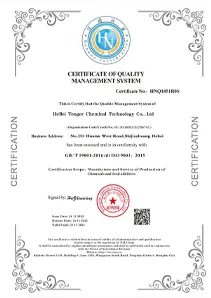
edible emulsifiers
The Role of Edible Emulsifiers in Food Industry
Emulsifiers are vital ingredients in the food industry, playing a significant role in enhancing the texture, stability, and shelf life of various food products. Among the diverse range of food additives, edible emulsifiers are particularly important due to their ability to facilitate the mixing of ingredients that typically do not combine easily, such as oil and water. This article delves into the significance of edible emulsifiers, their types, and their applications in the food industry.
At its core, an emulsifier is a substance that helps to stabilize emulsions, which are mixtures of two immiscible liquids. These compounds possess both hydrophilic (water-attracting) and hydrophobic (water-repelling) properties, allowing them to reduce the surface tension between oil and water droplets. This unique characteristic enables emulsifiers to form and maintain stable emulsions, which are crucial for a variety of food products.
One of the most common natural emulsifiers is lecithin, primarily derived from soybeans and egg yolks. Lecithin is prized for its versatility and is widely used in products such as mayonnaise, salad dressings, and chocolate. Another natural emulsifier is mustard, which contains mucilage that aids in emulsifying oil and vinegar for salad dressings. Other plant-based emulsifiers include gum arabic, guar gum, and xanthan gum, which are often used in dairy products and sauces to improve their consistency and stability.
edible emulsifiers

Synthetic emulsifiers are also prevalent in the food industry. Examples include mono- and diglycerides, polysorbates, and sorbitan esters. These emulsifiers are manufactured to provide specific functionalities, such as improving texture and extending shelf life. For instance, polysorbate 80 is frequently used in ice cream to create a smooth texture by preventing the formation of large ice crystals.
The benefits of utilizing edible emulsifiers extend beyond mere stability. They can improve the mouthfeel, enhance flavor distribution, and increase the overall quality of food products. In baked goods, emulsifiers help to aerate the dough, leading to a lighter texture. In dairy products, they prevent the separation of fat and water, ensuring a creamy consistency. In sauces and dressings, emulsifiers allow for a homogenous mixture, enhancing the sensory attributes of the product.
Despite their many advantages, the use of emulsifiers is not without controversy. Some consumers express concerns about synthetic emulsifiers, linking them to potential health issues, while others prefer natural options. This has led to a growing demand for clean-label products, prompting manufacturers to explore natural and non-GMO emulsifiers as alternatives to synthetic options.
In conclusion, edible emulsifiers are essential components of the food industry, contributing to the stability, texture, and overall quality of a wide range of products. Whether derived from natural sources like lecithin or produced synthetically, these compounds play a crucial role in our daily diets. As consumer preferences evolve, the food industry will continue to adapt, exploring innovative emulsifying agents that meet both quality and safety standards. Understanding the importance and function of emulsifiers allows consumers and producers alike to appreciate the science behind the food we enjoy.
-
Pure Sodium Dichloroisocyanurate Dihydrate | Powerful DisinfectantNewsAug.29,2025
-
Industrial Chemicals: Quality & Purity for Every IndustryNewsAug.28,2025
-
Nitrile Rubber Honoring Strict Production StandardsNewsAug.22,2025
-
Aspartame Ingredients Honoring Food Safety ValuesNewsAug.22,2025
-
Fertilizer for Balanced Plant NutritionNewsAug.22,2025
-
Cyanide Gold Processing with High Purity AdditivesNewsAug.22,2025
-
Formic Acid in Textile Dyeing ApplicationsNewsAug.22,2025
Hebei Tenger Chemical Technology Co., Ltd. focuses on the chemical industry and is committed to the export service of chemical raw materials.
-

view more DiethanolisopropanolamineIn the ever-growing field of chemical solutions, diethanolisopropanolamine (DEIPA) stands out as a versatile and important compound. Due to its unique chemical structure and properties, DEIPA is of interest to various industries including construction, personal care, and agriculture. -

view more TriisopropanolamineTriisopropanolamine (TIPA) alkanol amine substance, is a kind of alcohol amine compound with amino and alcohol hydroxyl, and because of its molecules contains both amino and hydroxyl. -

view more Tetramethyl Thiuram DisulfideTetramethyl thiuram disulfide, also known as TMTD, is a white to light-yellow powder with a distinct sulfur-like odor. It is soluble in organic solvents such as benzene, acetone, and ethyl acetate, making it highly versatile for use in different formulations. TMTD is known for its excellent vulcanization acceleration properties, which makes it a key ingredient in the production of rubber products. Additionally, it acts as an effective fungicide and bactericide, making it valuable in agricultural applications. Its high purity and stability ensure consistent performance, making it a preferred choice for manufacturers across various industries.





